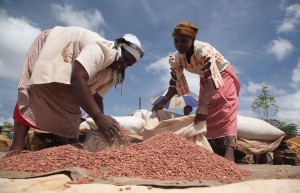“Because WFP takes long to pay, some farmers are forced to sell at the lowest price since farmers want money immediately. We need WFP to pay us immediately we deliver the maize, not after three weeks or a month as is currently the practice,” says Kiplagat.
“It is discouraging if farmers supplied their produce and they are being told to wait. Many farmers live hand to mouth. Even with the warehouse receipt, you can’t tell a farmer that you have a receipt or an invoice you sent to WFP. Farmers ask us whether they will eat receipt and invoice, or whether they will pay school fees with the warehouse receipt or invoice to WFP. Farmers expect their money immediately you take their crop and this long process of processing and late payment is generating a lot of contention in our farmers,” Kakuba also contends.
The WFP in Uganda says they are working to overcome this challenge. “It is true that farmers deserve to be paid quickly for their products because they have needs they need to address and also need to re-invest their money as quickly as possible. WFP procurement procedures, which are designed to promote transparency and honesty, have caused some delays in the past. However, today, we are able to pay farmers within seven working days of receiving an invoice of the product under sale. Furthermore, there is the option of farmers using the forward contract or the warehouse receipt to get up to 60 to 80 percent of the value of their commodities from certain financial institutions,” Wamala explains.
But Kiplagat says this is not a currently available option for many farmers, since banks are just starting to get interested in offering agriculture loans. “Loans are not got in one or two days. Imagine a farmer has spent his scarce money, energy and other resources to farm, has harvested, invested more in processing and storing, and now they have to undergo a process of applying for a loan?” Kiplagat asks.
Raising small farmers to benefit from agriculture markets
Farmers interviewed believe a lot of infrastructural, input, farming, storing and marketing help is needed in the farming communities before smallholder farmers can fully benefit from improved agriculture markets such as the one being provided by WFP under purchase for progress. Kakuba says for example Simuntu farmers Group have one small truck that transports produced for over 100 members, yet the farmers are spread far apart and warehouse is 40 kilometers away in Jinja.
As a matter of fact, Simuntu farmers group have been advised by WFP to break into more groups because they were failing to deliver on some of the WFP contracts due to the large number of members.
“Since farmers harvest almost at the same time, we fail to beat the time required to deliver for WFP. We also need to be helped with tractors for cultivation so that we mechanize our farming. It will cut down on the costs for farmers and enable us to get a better yield,” Kakuba says. But other farmers say gainful farming will require much more than a mechanization of farming.
“WFP should give farmers the inputs, the pesticides, the fertilizers, the sprays and help with the cleaning so that more farmers are able to benefit from their direct purchase,” says Aida Kityabi, a member of Mbulamuti Cereal group.
“While we would appreciate help of a combined harvester and a planter, we also need a pre cleaner, which would reduce on the cleaning costs in the warehouse. The longer the process the farmer has to go through to produce the require quality, the higher the costs,” reasons Nsubuga.
He says since weather changes have made seasons less predictable, farmers are not assured of a good harvest, even after investing in better seeds, fertilizers and more money in farm labour. “We therefore need irrigation systems. It is currently difficult for an ordinary farmer to do irrigation on their own. Unless you are near a big river, you need to depend on a borehole, which costs about 20 million shillings to erect,” Nsubuga adds.
Vincent Nkono, a farmer in Mbulamuti Sub-County and Vice Chairperson of the Farmer’s Forum that monitors the National Agricultural Advisory Services says apart from helping farmers with inputs, produce stores should be established nearer to farmers, since many farmers are currently losing a lot of produce due to poor post harvest handling that affects both the quality and quantity of produce.
In Kapchorwa district for example, although about 51,000 tons of cereals were produced in 2008, 40% was lost to vermin or got rotten because of poor storage facilities and humid conditions.
WFP Looking Forward to better agriculture markets
WFP’s Samkange says all the challenges and lessons being learnt are helping… see more on next page 5


Pingback: Multimedia news information advertising Services in Uganda East Africa | Reliable Media Consult (U) Ltd
Pingback: World Food Program to buy maize from Gulu farmers | Uganda Multimedia News & Information